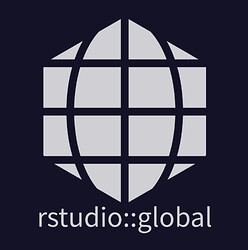This is a companion discussion topic for the original entry at https://blog.rstudio.com/2020/11/30/diversity-scholarships
rstudio::global(2021) will be a very different conference from previous years. We will miss being together physically, but we are enthusiastic about planning this free, virtual event designed to be inclusive of R users in every time zone. Even though the conference itself is free, we are continuing our tradition of diversity scholarships, but with a different focus.
This year, we have planned for 70 diversity scholarships available to individuals around the world who are a member of a group that is underrepresented at rstudio::conf(). These groups include people of color, those with disabilities, elders/older adults, LGBTQ folks, and women/minority genders. In past years, we have had to limit our scholarships geographically due to visa issues and we are happy to have no such limitations this year.
The scholarships will have three main components:
- Opportunities for online networking and support before and during the virtual conference
- Two workshops, taught online the week after rstudio::global(2021)
- Practical support, if needed, to enable participation in the virtual conference (such as an accessibility aid, a resource for internet access, or childcare)
The two workshops will be taught by some of RStudio’s most skilled and experienced educators, focusing on topics about sharing knowledge and teaching others.
Mine Çetinkaya-Rundel will lead a workshop titled: “What they forgot to teach you about teaching R”:
In this workshop, you will learn about using the RStudio IDE to its full potential for teaching R. Whether you’re an educator by profession, or you do education as part of collaborations or outreach, or you want to improve your workflow for giving talks, demos, and workshops, there is something for you in this workshop. During the workshop we will cover live coding best practices, tips for using RStudio Cloud for teaching and building learnr tutorials, and R Markdown based tools for developing instructor and student facing teaching materials.
Alison Hill will lead a workshop on building websites using R Markdown:
“You should have a website!” You may have heard this one before, or even said it yourself. In this workshop, you’ll learn how to build and customize a website from the comfort of the RStudio IDE using the blogdown package. We’ll also cover basic website care and feeding like using R Markdown to create content, and how to use GitHub and Netlify to improve your workflow. Pre-work will be shared with participants ahead of time, but to get the most out of this workshop, you’ll want to have a GitHub account and be able to push and pull files from a GitHub repository using your local RStudio IDE.
Since this year’s diversity scholarships focus on skills for teaching and sharing, applications will be evaluated considering experience and plans relevant to those skills. We know that people with marginalized identities are often experts and leaders investing in our communities, not only beginners. There are two main criteria:
- Do you already have some experience with R and GitHub? The workshops will assume some working knowledge of both, so show us some of your current work. (If you are new to GitHub, check out GitHub’s Hello World to get some of your content up in under an hour.)
- What are your current experiences and future plans for knowledge sharing and community building? This is the main theme and focus of our diversity scholarships this year, and we want to multiply our impact through individuals who will spread the love.
Even with 70 scholarships this year, we expect them to remain competitive, so be sure to highlight your own unique perspective. The application deadline is December 18, 2020.
